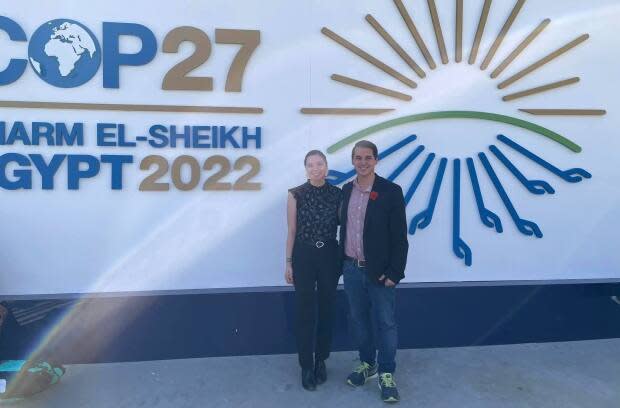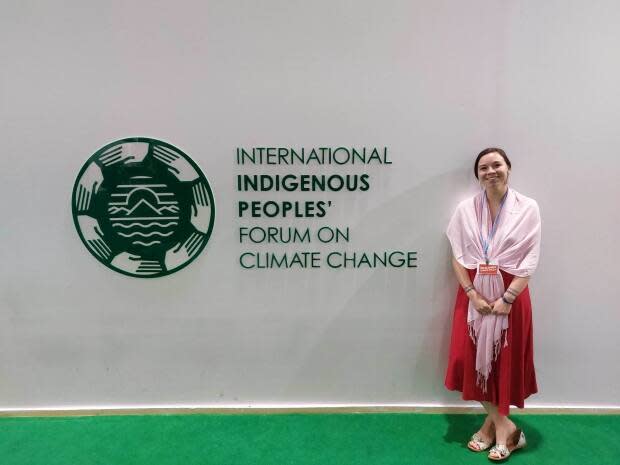N.L. climate activists reflect on lessons learned, and shared, at COP27 summit


Climate change activists from Newfoundland and Labrador are catching their breath after returning from the COP27 conference in Sharm El Sheikh, Egypt, last week.
Brian Pottle, president of the National Inuit Youth Council, and climate advocate Megan Dicker Nochasak of Nain brought the perspective of Indigenous peoples to the forefront of the world stage, taking part in various discussions and panels.
The Nunatsiavut-raised Pottle called the experience "overwhelming at times" but said the event had a certain electricity and infectious energy.
"You can't help but feel really optimistic for the future when you're surrounded by so many colleagues, peers and people you're not aware of the world over who share the same vision for a greener future," said Pottle. "One where the climate, but more the environment, is prioritized."
During the conference, Pottle sat on a panel about youth and Indigenous leadership and its role on Canada's road to net-zero emissions. He said young people are beginning to occupy the necessary roles "to be effective changers" of their communities.
While Pottle says there were many great experiences to come out of the event, one highlight stands out.
As a member of the UN's Indigenous Peoples caucus, he was asked to represent the Arctic region in speaking with Brazilian president-elect Luiz Inácio Lula da Silva on behalf of the Inuit and the Sámi — Indigenous people of northern Europe.
"It was incredible," said Pottle, "to share the Inuit and Sámis' collective concerns on climate change in the Arctic."
Pottle says he didn't think of the importance of the moment until he had some time to reflect. The chance to speak with world leaders about the planet's most difficult issues doesn't happen every day, he noted.
"One of the things I found myself reflecting on was, 'Why aren't we seeing this more?' Why aren't, for example, the Indigenous peoples being met by Prime Minister Trudeau in Canada?" said Pottle.
"That was one thing that really struck me. Something as groundbreaking as this, meeting with a world leader, but it's not even seeming to happen that often within Canada."

The future of Indigenous policy
Dicker Nochasak, who was invited to the conference by Environment and Climate Change Canada, called the experience "a whirlwind," adding that her goal was to push for more Indigenous inclusion in policy.
"A lot of panels at COP27, but also at other conferences, usually have, like, an Indigenous person providing an Indigenous perspective, but that's usually as far as it goes," said Dicker Nochasak. "So I asked, 'When are we going to stop just including an indigenous person to share their perspective and actually implement indigenous policies and climate action?'"
Dicker Nochasak says she received several answers, but none were as clear as she would have liked. Given their unique outlook, she said, Indigenous peoples need to be consulted to combat the global threat of climate change.
"As Indigenous people, we provide a different world view of how to solve, or how to work on climate differently than what governments can, which is why it's integral for governments to listen."
Dicker Nochasak says her biggest takeaway from her experience at COP27 is the importance of a paradigm shift in order to better the environment.
"When the land is unhealthy, so are the people," said Dicker Nochasak. "So it is a human rights issue. "If we care about our people, we care about our land, we'll sit down and create something. We have to be done just talking."
AUDIO | Brian Pottle discusses COP27


